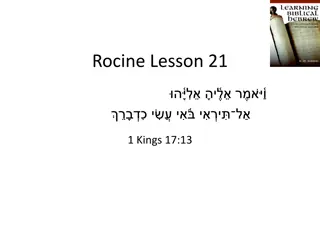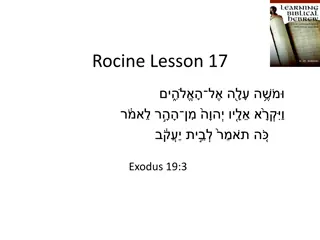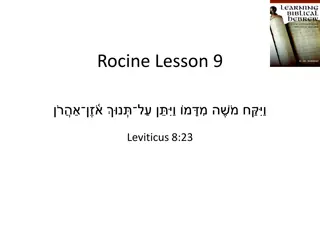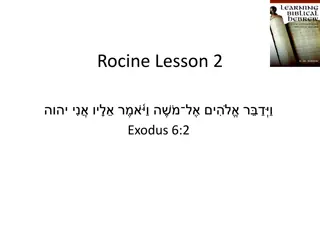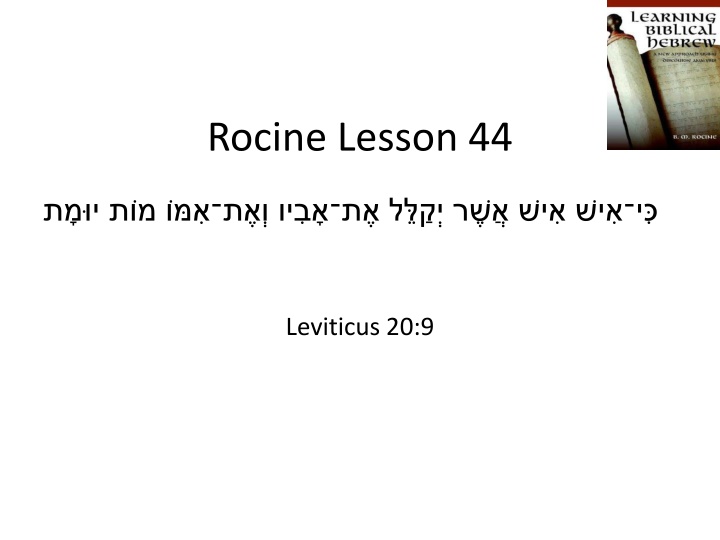
Juridical Discourse in Leviticus 20:9
Explore the concept of Juridical Discourse in the Bible using Leviticus 20:9 as a reference point. Learn about the construction and examples of Protasis-apodosis in legal codes, focusing on the implications of cursing one's parents. Discover the significance of the Hophal stem in the context of biblical interpretation.
Download Presentation

Please find below an Image/Link to download the presentation.
The content on the website is provided AS IS for your information and personal use only. It may not be sold, licensed, or shared on other websites without obtaining consent from the author. If you encounter any issues during the download, it is possible that the publisher has removed the file from their server.
You are allowed to download the files provided on this website for personal or commercial use, subject to the condition that they are used lawfully. All files are the property of their respective owners.
The content on the website is provided AS IS for your information and personal use only. It may not be sold, licensed, or shared on other websites without obtaining consent from the author.
E N D
Presentation Transcript
Rocine Lesson 44 Leviticus 20:9
Goals Identify and read Juridical Discourse Hophal stem
What we already know Translate the middle part of the lesson verse means to curse, slight in the Piel
What we already know Translate the middle part of the lesson verse means to curse, slight in the Piel a man who curses his father or his mother
Juridical Discourse This verse is an example of Juridical Discourse Note on pronunciation juridical = ju/RI/di/kel judicial = ju/DISH/el Juridical Discourse is the genre for legal codes in the Bible Mostly found in Exodus Deuteronomy, but elsewhere as well
Juridical Discourse Predominant construction in Juridical Discourse is protasis-apodosis. Protasis pro before Apodosis apo after When/If Then
Juridical Discourse Protasis or followed by Apodosis Yiqtol <- Inf. Abs. 1 Yiqtol <- Subject 1 A man who curses he shall surely be put to death. 2 Yiqtol + Subject <- Yiqtol 2 If he (a slave) continues a day or two, then he (an assailant) will not be punished. If an ox gores a man Yiqtol followed by weqatals x-yiqtols 3 X-yiqtol 3 If by himself he comes in, then by himself he will go out. If your brother becomes poor and sells part of his property One or more weqatals 4 And if the one with a discharge spit upon one who is clean, then he will wash his garments and rinse in water and he will be unclean until the evening.
Juridical Discourse Protasis or followed by Apodosis Yiqtol <- Inf. Abs. 1 Yiqtol <- Subject 1 A man who curses he shall surely be put to death. 2 Yiqtol + Subject <- Yiqtol 2 If he (a slave) continues a day or two, then he (an assailant) will not be punished. If an ox gores a man Yiqtol followed by weqatals x-yiqtols 3 X-yiqtol 3 If by himself he comes in, then by himself he will go out. If your brother becomes poor and sells part of his property One or more weqatals 4 And if the one with a discharge spit upon one who is clean, then he will wash his garments and rinse in water and he will be unclean until the evening. Note: If the protasis ends with a weqatal clause and the apodosis begins with a weqatal clause the boundary between the protasis and apodosis can be challenging to find. E.g. compare Lev 25:25 in KJV and RSV.
Hophal stem The last word in the lesson verse is a Hophal. Let s try and parse it. Root Stem Form PGN Function Root meaning Also, see AnimatedHebrew lecture 31 for a discussion of the Hophal.
Hophal stem The last word in the lesson verse is a Hophal. Let s try and parse it. Root Stem Form PGN Function Root meaning To die, Hophal Yiqtol 3ms Apodosis be put to death (hophal) Also, see AnimatedHebrew lecture 31 for a discussion of the Hophal.
Hophal stem RULE: The Hophal stem is the passive version of the Hiphil stem. Its sign in all forms is a qamets, shureq, or qibbuts under the pre-formed letters that correspond to the Hiphil stem or the yiqtol form s prefixed subject pronoun.
Hophal stem RULE: The Hophal stem is the passive version of the Hiphil stem. Its sign in all forms is a qamets, shureq, or qibbuts under the pre-formed letters that correspond to the Hiphil stem or the yiqtol form s prefixed subject pronoun. Strong, I-Gutt, I-Aleph, III-Heh Actually it s qamets-hatuph. I-Waw, Hollow, Geminate I-Nun
Hophal stem RULE: The Hophal stem is the passive version of the Hiphil stem. Its sign in all forms is a qamets, shureq, or qibbuts under the pre-formed letters that correspond to the Hiphil stem or the yiqtol form s prefixed subject pronoun. I.e., for any given weak verb, the Hophal has the same vowel for all its forms. Very nice! (Note: there is some variation in the participles.) Strong, I-Gutt, I-Aleph, III-Heh I-Waw, Hollow, Geminate I-Nun
See Rocine 44.3c (p. 247) for a table of principal parts for the very common verb in the Hiphil and Hophal stems.

